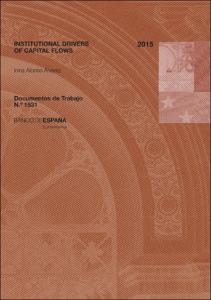Institutional drivers of capital flows
Autor
Fecha de publicación
16-nov-2015
Descripción física
42 p. : gráf., tab.
Resumen
Este trabajo analiza de forma empírica el papel que desempeñan los factores institucionales en la determinación de los flujos brutos de capital. Se construye un índice de calidad institucional y se evalúa su impacto en la evolución de las entradas y de las salidas de capital brutas, utilizando un panel de 56 países y distinguiendo entre economías de altos ingresos y de bajos ingresos, entre 1996 y 2012. Se muestra que la calidad institucional es un factor significativo para explicar el comportamiento tanto de inversores extranjeros como de inversores nacionales. Los países con un entorno más favorable en términos de gobernanza y de credibilidad del sector público tienden a atraer más flujos de capital. Gracias al análisis econométrico de variables instrumentales, se confirma la existencia de causalidad para una submuestra de 25 países. Asimismo, señalamos que determinados rasgos institucionales son más importantes que otros. En concreto, los indicadores institucionales más relevantes son Eficacia gubernamental y Calidad regulatoria, que captan la capacidad del Gobierno para implantar políticas adecuadas, fiables y creíbles. Por último, se evalúa el papel de la calidad institucional en períodos de estrés financiero. El análisis sugiere que los inversores nacionales residentes en países con un marco institucional sólido tienden a repatriar más capital, mitigando parcialmente los efectos negativos de una menor entrada de flujos de capital brutos. Por tanto, una buena calidad institucional incentiva la acumulación de activos externos en los países de altos ingresos, mediante una mayor salida de capitales en tiempos normales, pero también facilita la repatriación de dichos activos en épocas de crisis
This paper empirically analyzes the role of institutional factors in shaping the dynamics of gross capital flows. We build an institutional quality index and test its relevance for both gross capital inflows and outflows using a panel of 56 countries, differentiating between high-income and low-income economies, over the period 1996-2012. We find that institutional quality is a significant factor affecting the behavior of both foreign and domestic investors. Countries with better governance and public sector credibility tend to attract more flows. Causality is confirmed through IV estimates for a sub-sample of 25 countries. In addition, we show that some governance features matter more than others. Specifically, the most relevant institutional indicators are Government Effectiveness and Regulatory Quality, which capture the government’s ability to implement adequate, sound and credible policies. Finally, we assess the role of institutional quality during periods of financial stress. The analysis suggests that domestic investors in countries with a sound institutional framework tend to retrench more capital, mitigating the negative effects of declining gross capital inflows. Therefore, sound institutions incentivize the build-up of external assets in high-income countries by promoting larger outflows in normal times. They also facilitate the repatriation of such assets during crises
This paper empirically analyzes the role of institutional factors in shaping the dynamics of gross capital flows. We build an institutional quality index and test its relevance for both gross capital inflows and outflows using a panel of 56 countries, differentiating between high-income and low-income economies, over the period 1996-2012. We find that institutional quality is a significant factor affecting the behavior of both foreign and domestic investors. Countries with better governance and public sector credibility tend to attract more flows. Causality is confirmed through IV estimates for a sub-sample of 25 countries. In addition, we show that some governance features matter more than others. Specifically, the most relevant institutional indicators are Government Effectiveness and Regulatory Quality, which capture the government’s ability to implement adequate, sound and credible policies. Finally, we assess the role of institutional quality during periods of financial stress. The analysis suggests that domestic investors in countries with a sound institutional framework tend to retrench more capital, mitigating the negative effects of declining gross capital inflows. Therefore, sound institutions incentivize the build-up of external assets in high-income countries by promoting larger outflows in normal times. They also facilitate the repatriation of such assets during crises
Publicado en
Documentos de Trabajo / Banco de España, 1531
Materias
Flujos brutos de capital; Instituciones; Eficacia gubernamental; Calidad regulatoria; Repatriación de capital y crisis; Gross capital flows; Institutions; Government effectiveness; Regulatory quality; Capital retrenchment and crises; Blanqueo de capitales; Finanzas internacionales; Cooperación e integración monetarias; Instituciones y economía
Aparece en las colecciones:












